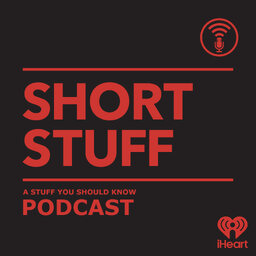Selects: How the Stanford Prison Experiment Worked
The infamous Stanford Prison Experiment wasn't really much of an experiment as it turns out. It was more like a poorly thought out exercise conducted by a professor who didn't dot the i's and cross the t's. Listen in to this classic episode as Josh and Chuck give this experiment some harsh treatment of their own.
In 1 playlist(s)
Stuff You Should Know
If you've ever wanted to know about champagne, satanism, the Stonewall Uprising, chaos theory, LSD, …Social links
Follow podcast
Recent clips

Short Stuff: Color Psychology
12:06

Helen Keller and Anne Sullivan: Miracle is Right
43:33

Selects: Operation Mincemeat: How A Corpse Fooled the Nazis
45:18
 Stuff You Should Know
Stuff You Should Know